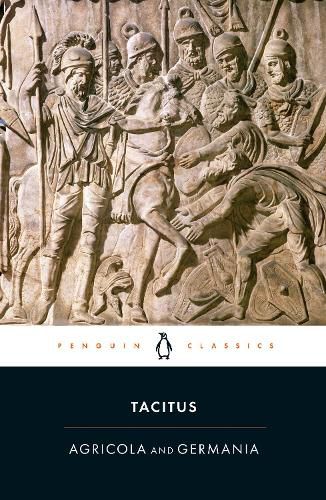Readings Newsletter
Become a Readings Member to make your shopping experience even easier.
Sign in or sign up for free!
You’re not far away from qualifying for FREE standard shipping within Australia
You’ve qualified for FREE standard shipping within Australia
The cart is loading…






This is a lightly revised edition of Mattingly’s original translation plus a new introduction, new notes, a chronology and further reading, by James Rives
The Agricola is both a portrait of Julius Agricola - the most famous governor of Roman Britain and Tacitus’ well-loved and respected father-in-law - and the first detailed account of Britain that has come down to us. It offers fascinating descriptions of the geography, climate and peoples of the country, and a succinct account of the early stages of the Roman occupation, nearly fatally undermined by Boudicca’s revolt in AD 61 but consolidated by campaigns that took Agricola as far as Anglesey and northern Scotland. The warlike German tribes are the focus of Tacitus’ attention in the Germania, which, like the Agricola, often compares the behaviour of ‘barbarian’ peoples favourably with the decadence and corruption of Imperial Rome.
$9.00 standard shipping within Australia
FREE standard shipping within Australia for orders over $100.00
Express & International shipping calculated at checkout
Stock availability can be subject to change without notice. We recommend calling the shop or contacting our online team to check availability of low stock items. Please see our Shopping Online page for more details.
This is a lightly revised edition of Mattingly’s original translation plus a new introduction, new notes, a chronology and further reading, by James Rives
The Agricola is both a portrait of Julius Agricola - the most famous governor of Roman Britain and Tacitus’ well-loved and respected father-in-law - and the first detailed account of Britain that has come down to us. It offers fascinating descriptions of the geography, climate and peoples of the country, and a succinct account of the early stages of the Roman occupation, nearly fatally undermined by Boudicca’s revolt in AD 61 but consolidated by campaigns that took Agricola as far as Anglesey and northern Scotland. The warlike German tribes are the focus of Tacitus’ attention in the Germania, which, like the Agricola, often compares the behaviour of ‘barbarian’ peoples favourably with the decadence and corruption of Imperial Rome.